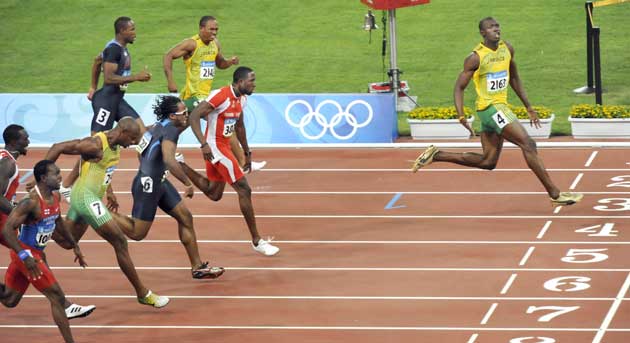Bolt of lightning leaves the rest of mankind far behind

When he entered the home straight in the Beijing National Stadium for a second time after the gun had fired for the Olympic 100m final, Usain Bolt stretched out his arms and launched into an aeroplane impression. As if we didn't already know we had seen a flying machine here in the concrete Bird's Nest in the Chinese capital.
For 9.69 seconds, this 6ft 5in Jamaican phenomenon had taken off and touched speeds no human had ever before reached without technological assistance. He had done so while shutting down the engines some 20 metres from the line, glancing to his right (presumably in the ill-founded notion that someone might be within his air space), then dropping both arms to his side, as if to say to his mother sitting up in the stands, "Hey, mum, get me". Not in the preening, arrogant manner of so many American speed merchants, but in the fashion of a 21-year-old free-flying free spirit who is busy redefining the term "Cool Runnings".
The young man from Trelawny (the Jamaican parish named after a Cornishman, Sir William Trelawny, a former MP for East Looe) still had time to beat his right hand against his chest, on the name of his homeland printed on his yellow-and- green vest. After a wait of 102 years, Jamaica finally had an Olympic 100m champion to match its rich sprinting tradition. A human flying machine who is still a long way from reaching the extremity of his personal speed limit, let alone mankind's.
The world had seen nothing quite like it before. Even Ben Johnson, bulging to the yellowed eyeballs with anabolic steroids, didn't produced quite such a jaw-dropping performance in the most celebrated, most notorious running of this blue riband race. He had been flat to the boards for all but the last five metres in Seoul 20 years ago. Jamaican-born but running for an adopted homeland (like Linford Christie in 1992 and Donovan Bailey in 1996), Johnson – pumped up on a chemical called Stanozolol – won by 0.13sec from Carl Lewis. Bolt, at something around three-quarter throttle, prevailed by 0.20sec, equalling the record Olympic 100m winning margin since the introduction of electronic, hundredths-of-a-second timing, established by the flat-out Lewis in Los Angeles in 1984.
So what fuelled the boy with the golden spikes and laid-back Midas touch, having eclipsed his own world record by 0.03sec as if he was taking an evening stroll down to the nearest beachside Caribbean bar? What had he had for breakfast yesterday? Other than the two next fastest humans of all time, that is: his Jamaican team-mate, Asafa Powell, who continued his depressing run of wilting under the big-race pressure, trailing home fifth in 9.95sec, and the far from race-sharp world champion at the distance, Tyson Gay, whose challenge foundered at the semi-final hurdle.
Bolt, his Jamaican cap askew, considered the question in his nonchalant, unhurried fashion. "Ah, I never had breakfast. Woke up at 11am. Sat around. Watched TV. Had lunch – some nuggets. Then went back to my room. Slept three hours. Got some more nuggets. Came down to the track." Not quite the Michael Phelps Olympic Breakfast diet but the same result: one giant golden nugget of an Olympian.
The question now is: just how quick can the lightning Bolt strike? "He could have run 9.55sec today," Marc Burns, the seventh- placed Trinidadian, said (for the record, Richard Thompson, also of Trinidad, took silver in 9.89sec and Walter Dix of the US was third in 9.91). "I haven't seen a replay so I can't really say," Bolt said. "People have said to me 9.60 but I can't really comment. I wasn't worried about the world record. I didn't know it was a record until I finished my victory lap. My one aim was to be Olympic champion."
Bolt's aim now is to become a double Olympic champion. He gets back on to his launch pad for the first round of the 200m tomorrow. Michael Johnson's world record at the distance, the 19.32 the American ran at the Atlanta Games of 1996, has suddenly been reined in from the untouch-able to the seriously imperilled. But the chilled-out flying machine might just have to break into a sweat to claim that.
"Ah, I was having fun," he said of his antics before he crossed the line. "That's just me. I like to have fun, just stay relaxed."
Yes, Mr Lightning Bolt, we did kind of notice.
Record breakers
9.95sec Jim Hines (US), 14 October 1968, Mexico City
9.93 Calvin Smith (US), 3 July 1983, Colorado Springs, US
9.92 Carl Lewis (US), 30 August 1983, Rome
9.92 Lewis, 24 September 1988, Seoul, South Korea
9.90 Leroy Burrell (US), 14 June 1991, New York
9.86 Lewis, 25 August 1991, Tokyo
9.85 Burrell, 6 July 1994, Lausanne, Switzerland
9.84 Donovan Bailey (Canada), 27 July 1996, Atlanta
9.79 Maurice Greene (US), 16 June 1999, Athens
9.77 Asafa Powell (Jam), 14 June 2005, Athens
9.74 Powell, 9 September 2007, Rieti, Italy
9.72 Usain Bolt (Jam), 31 May 2008, New York
9.69 Bolt, 16 August 2008, Beijing
Join our commenting forum
Join thought-provoking conversations, follow other Independent readers and see their replies
Comments
Bookmark popover
Removed from bookmarks